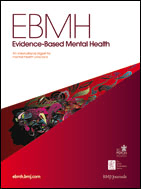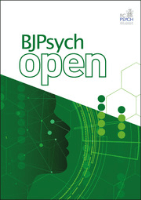
Evidence-Based Mental Health
Scope & Guideline
Enhancing Mental Health Outcomes through Research
Introduction
Aims and Scopes
- Evidence-Based Interventions:
The journal prioritizes research on interventions that are grounded in empirical evidence, including psychotherapy, pharmacotherapy, and digital health solutions. This focus supports the development and validation of effective treatment methods for various mental health conditions. - Systematic Reviews and Meta-Analyses:
The publication regularly features systematic reviews and meta-analyses, providing comprehensive evaluations of existing studies. These articles synthesize evidence to inform clinical guidelines and practice, ensuring that mental health practitioners have access to the latest findings. - Mental Health Policy and Practice:
Research that examines the implications of mental health policies and practices is a core area of focus. The journal addresses how evidence can influence policy decisions, healthcare delivery, and the integration of mental health services into broader health systems. - Innovative Methodologies:
The journal encourages the use of innovative research methodologies, such as digital interventions and adaptive trials. This includes studies that leverage technology for mental health assessments and interventions, reflecting the evolving landscape of mental health care. - Population-Specific Research:
There is a consistent emphasis on research that addresses mental health issues across diverse populations, including children, adolescents, and marginalized groups. This focus aims to ensure that interventions are tailored to the unique needs of different demographic groups.
Trending and Emerging
- Digital Mental Health Interventions:
There is an increasing focus on digital interventions, such as digital cognitive-behavioral therapy and smartphone applications, reflecting the growing recognition of technology's role in mental health care. This trend is particularly relevant in the context of the COVID-19 pandemic, which has accelerated the adoption of telehealth solutions. - Mindfulness and Well-Being Programs:
Research on mindfulness-based interventions, particularly in school settings, is trending. These studies explore the effectiveness of mindfulness in promoting mental health and well-being among children and adolescents, highlighting its potential as a preventive measure. - Impact of Social Isolation and Community Health:
The psychological impacts of social isolation, especially during the COVID-19 pandemic, have gained prominence. Research exploring behavioral activation and community-based approaches to mitigate these impacts reflects a growing awareness of the social determinants of mental health. - Personalized and Precision Mental Health:
Emerging themes include personalized treatment approaches and the use of predictive models to tailor interventions to individual needs. This reflects a shift towards more individualized care in mental health, informed by data and patient characteristics. - Comorbidity and Integrated Care Models:
There is a trend towards exploring comorbid mental health conditions and integrated care models that address multiple health issues simultaneously. This approach recognizes the complexity of mental health and the need for comprehensive treatment strategies.
Declining or Waning
- Traditional Psychotherapy Approaches:
Research focusing exclusively on traditional psychotherapy methods, without integration of evidence-based modifications or digital enhancements, is becoming less common. The emphasis has shifted towards more innovative and adaptive approaches that leverage technology. - Generalized Mental Health Assessments:
There is a noticeable decline in studies that employ broad, generalized assessments of mental health. Instead, there is a growing preference for targeted assessments that focus on specific populations or conditions, reflecting a more nuanced understanding of mental health. - Single-Disorder Focused Research:
Research that examines single mental health disorders in isolation is decreasing. The trend is moving towards studies that consider comorbidities and the interplay between different mental health issues, emphasizing a holistic view of mental health. - Pharmacological Interventions without Context:
There appears to be a waning interest in studies that report on pharmacological interventions without sufficient context regarding their effectiveness in real-world settings or among diverse populations. The journal is increasingly favoring research that contextualizes medication use within broader treatment frameworks.
Similar Journals

Current Psychiatry Research and Reviews
Advancing psychiatric knowledge for better mental health.Current Psychiatry Research and Reviews is an innovative open access journal dedicated to the dynamic field of psychiatry and mental health. Published by Bentham Science Publishers Ltd, this journal provides a platform for researchers and practitioners to disseminate pivotal findings, reviews, and advancements in psychiatric research. While the journal currently holds a Q4 status in the Psychiatry and Mental Health category, it seeks to elevate standards with interdisciplinary contributions aimed at improving patient outcomes and treatment methodologies. With a publication window spanning from 2019 to 2024, the journal aims to enhance global discussions in mental health sciences, encouraging submissions that explore evidence-based practices, innovative therapeutic techniques, and the epidemiology of mental health disorders. The journal's address in the Netherlands positions it strategically within Europe’s vibrant research community, making it an essential resource for researchers, professionals, and students alike who are invested in the evolution of psychiatric science.

Worldviews on Evidence-Based Nursing
Elevating standards in evidence-based nursing.Worldviews on Evidence-Based Nursing, published by WILEY, is a premier journal dedicated to advancing the field of nursing through the dissemination of high-quality research and innovative practices. With an impressive impact factor and recognition as a Q1 journal in both Medicine (miscellaneous) and Nursing (miscellaneous), this journal stands at the forefront of evidence-based nursing, providing a vital platform for researchers and professionals to share their findings. Established in 2004, the journal has continually fostered an interdisciplinary approach, welcoming submissions that reflect diverse perspectives within nursing and healthcare. While it does not currently offer open access, its rigorous peer-review process ensures that published articles meet the highest standards of scientific excellence. As the journal moves toward its converged years of publication until 2024, it remains committed to shaping the future of nursing practice through evidence and inquiry, making it an essential resource for dedicated scholars and practitioners alike.

Asia Pacific Journal of Counselling and Psychotherapy
Transforming lives through evidence-based counselling methodologies.Asia Pacific Journal of Counselling and Psychotherapy is a leading scholarly publication dedicated to advancing the fields of counselling and psychotherapy within the Asia-Pacific region. Published by Taylor & Francis Ltd, this journal serves as an essential platform for researchers, practitioners, and students to share innovative research, case studies, and theoretical discussions relevant to mental health practices. With an ISSN of 2150-7686, it aims to foster dialogue on diverse counselling methodologies, cultural contexts, and therapeutic interventions that address the unique challenges faced by individuals and communities in the Asia-Pacific area. Though the journal operates under a subscription model, its emphasis on high-quality, peer-reviewed content ensures that it is a trusted resource for both emerging and established professionals in the field. By promoting evidence-based practices and intercultural competence, the Asia Pacific Journal of Counselling and Psychotherapy plays a pivotal role in shaping the future of mental health support and education across the region.

Rivista di Psichiatria
Cultivating Innovation in Psychiatric DiscourseRivista di Psichiatria, published by PENSIERO SCIENTIFICO EDITORE, stands as a significant contributor to the field of Psychiatry and Mental Health since its inception in 1975. With an ISSN of 0035-6484 and an E-ISSN of 2038-2502, this esteemed journal offers a platform for rigorous academic discourse and cutting-edge research, helping to shape contemporary psychiatric practices and theories. Currently holding a Q2 designation in Psychiatry and Mental Health based on the 2023 category quartiles, and ranking #197 out of 567 in Scopus, it reflects a commendable 65th percentile among its peers. The journal welcomes contributions that encompass a broad range of topics related to mental health, encouraging contributions from a multidisciplinary approach, which aids in its goal of advancing the understanding and application of psychiatric science. While it is a traditional journal without Open Access options, access to its valuable content can support researchers, clinicians, and students in their pursuit of knowledge and innovation within the field. Situated in Rome, Italy, at VIA SAN GIOVANNI VALDARNO 8, ROME 00138, the journal continues to enhance its rich legacy, promoting the exchange of ideas and fostering collaboration amongst practitioners and scholars alike.

ACTA PSYCHIATRICA SCANDINAVICA
Exploring Groundbreaking Insights in PsychiatryACTA PSYCHIATRICA SCANDINAVICA is a leading journal in the field of Psychiatry and Mental Health, published by Wiley since its inception in 1926. With a strong commitment to advancing psychiatric research, this esteemed journal boasts an impressive impact factor and ranks within the top 7% of its category, reflecting its influence and relevance in the field. Operating without an Open Access model, the journal serves as a vital resource for professionals, researchers, and students keen on accessing high-quality, peer-reviewed studies focused on mental health issues. The scope of ACTA PSYCHIATRICA SCANDINAVICA spans a broad spectrum of psychiatric topics, providing a platform for groundbreaking research and clinical practice insights. Based in the United Kingdom and featuring contributions from experts worldwide, the journal continues to shape the future of psychiatric research through its rigorous publication standards and commitment to scholarly excellence.

BJPsych Open
Transforming mental health practices through open access knowledge.BJPsych Open, published by Cambridge University Press, is a leading open access journal dedicated to the field of psychiatry and mental health. Since its inception in 2015, the journal has provided a platform for disseminating cutting-edge research and evidence-based practices, making significant contributions to the academic community. With an impressive impact factor and currently ranking in the top Q1 quartile of its field, BJPsych Open is recognized for its rigor and relevance, ranking 138 out of 567 journals in psychiatry and mental health according to Scopus, placing it in the 75th percentile. The journal's commitment to open access enhances visibility and accessibility, ensuring that vital research is available to a global audience. Researchers, professionals, and students alike will find valuable insights into contemporary mental health challenges and innovative treatment approaches, making BJPsych Open an essential resource for advancing mental health scholarship.

Terapia Psicologica
Pioneering Insights in Clinical Psychology and Psychiatry.Terapia Psicologica is a distinguished peer-reviewed journal published by the SOCIEDAD CHILENA PSICOLOGIA CLINICA, focusing on the critical fields of Clinical Psychology and Psychiatry and Mental Health. Since its inception in 2008, this journal has emerged as a pivotal platform for disseminating innovative research and clinical practices in mental health, garnering attention in the academic community with its position in the Q3 quartile as of 2023. The journal serves as an invaluable resource for researchers, professionals, and students seeking to advance their understanding of psychological therapies and mental health interventions. Although Terapia Psicologica does not currently provide open access, its comprehensive scope ensures that vital findings reach a broad audience, enhancing the quality and impact of psychological practice across Chile and beyond. With its ISSN 0718-4808, the journal continues to contribute significantly to the evolving discourse in psychology, maintaining its relevance and importance in shaping future research and therapeutic practices.

PSYCHIATRIC SERVICES
Exploring the forefront of psychiatric services and practices.PSYCHIATRIC SERVICES is a leading academic journal published by American Psychiatric Publishing, Inc, dedicated to advancing the understanding and practice of psychiatric care. With a robust ISSN of 1075-2730 and an E-ISSN of 1557-9700, this journal serves as a vital resource for researchers, clinicians, and students in the fields of psychiatry and mental health. Recognized for its high-impact contributions, it holds a prestigious position in the top quartile (Q1) of both the Medicine (miscellaneous) and Psychiatry & Mental Health categories as of 2023, featuring in the Scopus rankings at #164 out of 567, placing it in the 71st percentile. PSYCHIATRIC SERVICES not only provides insights into innovative treatment methodologies and emerging research but also aims to foster a community of knowledge for improving mental healthcare outcomes. While not an Open Access journal, it remains an essential platform for disseminating cutting-edge research from 1995 to 2024 and continues to be an authoritative voice in the dynamic domain of psychiatric services.

BJPsych Advances
Advancing psychiatric knowledge for a healthier tomorrow.BJPsych Advances is a distinguished journal dedicated to the field of Psychiatry and Mental Health, published by Cambridge University Press. With an ISSN of 2056-4678 and an E-ISSN of 2056-4686, this journal serves as a crucial platform for disseminating high-quality research and advancements in psychiatric science. Holding a position in the Q3 quartile as of 2023, it ranks 330 out of 567 in the Scopus database, representing a significant contribution to the mental health community, with a 41st percentile status. The journal not only covers recent innovations and methodologies but also emphasizes practical applications in clinical settings, making it an essential resource for researchers, practitioners, and students alike. With a commitment to fostering a deeper understanding of psychiatric disorders and their implications, BJPsych Advances plays a vital role in enhancing the standards of mental healthcare across the globe, bridging the gap between academic research and clinical practice.

BRITISH JOURNAL OF PSYCHIATRY
Leading the Dialogue in Psychiatry and Mental HealthBritish Journal of Psychiatry, published by Cambridge University Press, stands as a pivotal resource in the realm of mental health and psychiatry. With an impressive impact reflected in its Q1 classifications in both Medicine (miscellaneous) and Psychiatry and Mental Health, this esteemed journal ranks 23rd out of 567 in its field according to Scopus, achieving an exceptional 96th percentile. Since its inception in 1963, the journal has continued to push the boundaries of research and discourse, serving as a platform for groundbreaking studies that enhance our understanding of psychiatric conditions and promote effective therapeutic strategies. Though it does not operate with an open-access model, the British Journal of Psychiatry remains an essential publication for researchers, clinicians, and students alike, offering in-depth insights and innovative findings that are crucial for navigating the complexities of mental health.